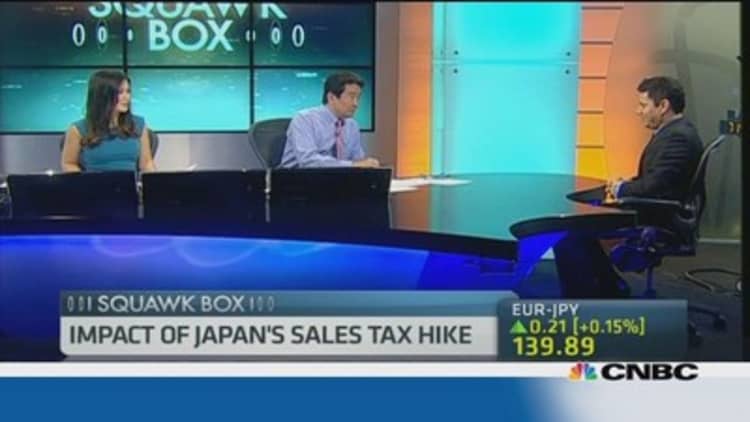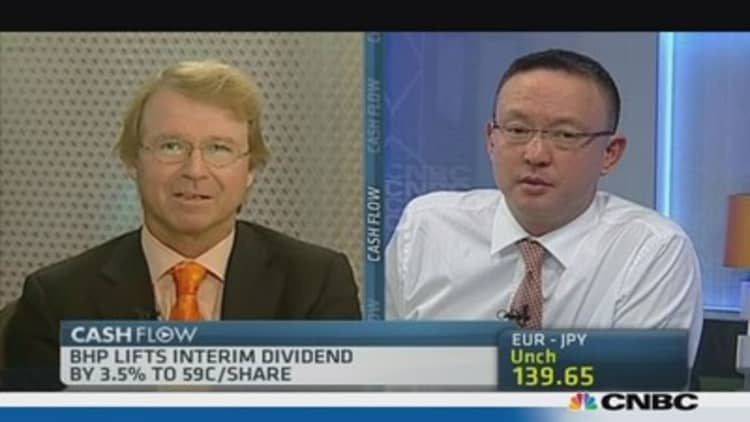Japan's benchmark index rallied on Tuesday following the Bank of Japan's monetary policy announcement but the rest of Asian shares were mixed on profit-taking.
Central banks dominated trade in Asia. The Bank of Japan left monetary policy steady at the conclusion of its two-day meeting and said it will extend a special lending program by one year to support the economy. Meanwhile, minutes from the Reserve Bank of Australia's latest meeting reaffirmed its commitment to a period of rate stability.
With U.S. markets shut on Monday for the President's Day holiday, traders looked to Europe for trading cues, where stocks closed higher, led by a 1 percent gain in the FTSE 100.
(Read more: What the Fed will tell markets this week)
Nikkei 3.1% higher

Japan's benchmark index ended at two-and-a-half-week high, extending gains into a second session as the yen weakened to 102.7 per dollar; both at levels not seen since January 31.
Banks were in focus following the Bank of Japan's loan extension scheme. Sumitomo Mitsui Financial and Mitsubishi UFJ Financial gained over 5 percent each.
Elsewhere, index heavyweights SoftBank and Fast Retailing surged over 4 percent each.
(Read more: Can Japan's rally continue without a third arrow?)
Automakers rallied despite heavy snowfall disrupting supply chains across the country on Monday. Toyota Motor rose 2.6 percent after re-opening three plants that were suspended, while Honda Motor added 2 percent despite halting operations at two facilities.
Shanghai eases 0.8%
Investors booked profits on the mainland's benchmark Shanghai Composite after it hit a two-month high on Monday. Caution also set in ahead of Thursday's HSBC flash purchasing managers' index (PMI) for February.
Mid-tier banks extended the previous day's declines after the People's Bank of China drained funds from money markets. Pudong Development Bank fell 2.7 percent while Minsheng Bank and Merchants Bank lost over 1 percent each.
Data showing that foreign direct investment rose an annual 16.1 percent in January was unable to lift sentiment.
(Read more: Yuan takes another step forward as a world currency)

Sydney up 0.2%
Australia's benchmark S&P ASX 200 index closed at a fresh three-month high, rising for a third straight session, as investors focused on the latest first-half earnings reports.
BHP Billiton rallied 2.3 percent after reporting a 31 percent rise in underlying profit, well above market forecasts. Steel maker Arrium fell 2 despite reporting a 294 percent profit increase, and Coca-Cola Amatil tanked 5.3 percent after full-year net profit declined by 82 percent.
(Watch: How BHP achieved stellar H1 revenue growth)
Qantas Airways declined 1.2 percent after The Australian Financial Review reported the carrier is likely to receive a debt guarantee from the federal government.
Meanwhile, the Australian dollar traded at $0.9036 per dollar, off Monday's one-month high, after the RBA said a lower currency would support economic growth in its February minutes.
Kospi flat
South Korean shares took a breather following Monday's near one-month high after data out in early trade showed January producer price inflation fell to a 16-month low.
S-Oil fell 0.3 percent after announcing it won a tender to buy land from Korea National Oil.
India up 0.8%
The benchmark Sensex index recovered from early losses thanks to strong foreign buying, finishing the session higher by 0.83 percent.
— By CNBC.com's Nyshka Chandran. Follow her on Twitter @NyshkaCNBC


